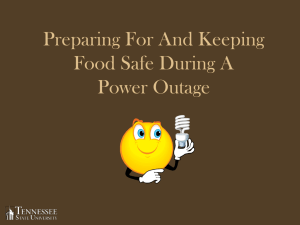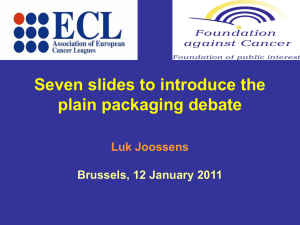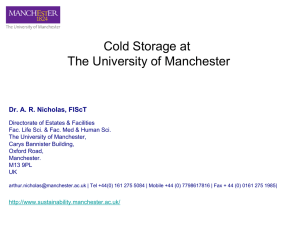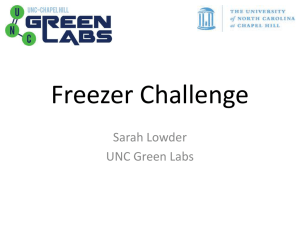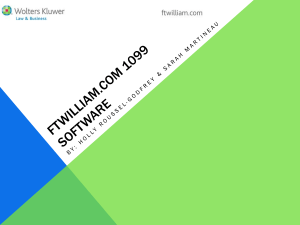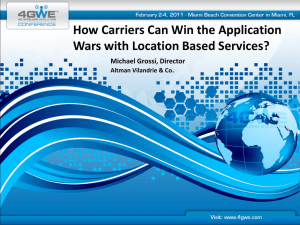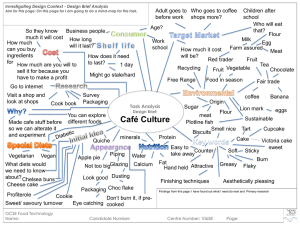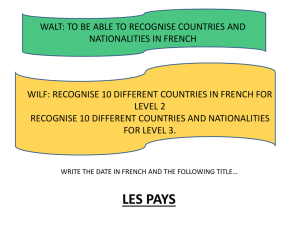Cryogenic Freezing Project
advertisement
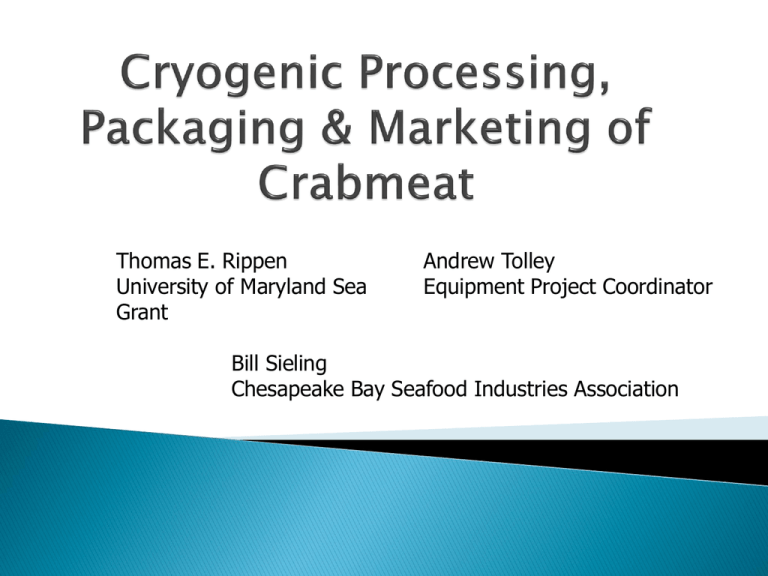
Thomas E. Rippen University of Maryland Sea Grant Andrew Tolley Equipment Project Coordinator Bill Sieling Chesapeake Bay Seafood Industries Association Strengths ◦ Can produce fresh, unpasteurized crabmeat ◦ Growing demand for local, fresh foods ◦ Local crabmeat recognized for high quality Weaknesses ◦ Crabs are seasonal, best crabs when demand ◦ Still need a way to extend shelf-life and inventory products ◦ Pasteurized crabmeat perceived as more highly processed, less fresh ◦ Traditional cans are expensive, available from only one manufacturer - must have a seamer for 401 Appropriated by Congress Administered in Maryland by MD DNR Subcontracted to University of Maryland to implement Current funds allocated in two awards for equipment, assistance (MCQAP and other projects), marketing Find alternative to pasteurizing in cans ◦ $392,000 for purchasing equipment 1 lb plastic cup Fresh pack, used for freezing in this test. 401 diameter pasteurized can 307 diameter pasteurized can Crabmeat containers 307 diameter MD pasteurized can Panama 307 closing machine Canco 60P 401 closing machine $27,400, between “as is and rebuilt” condition (Alard) Dehydration ◦ Water migration and recrystallization ◦ Hydrophobic interactions Concentration of reactants (What happened to Q10?) ◦ Enzymatic softening in some fish ◦ Formation of cross-links (e.g. formaldehyde from TMAO) ◦ Oxidation of oils (rancidity) Protein denaturation and structural damage – ◦ Toughening ◦ Excessive drip ◦ Bland flavor Oxidative changes ◦ Yellowing ◦ Off-flavors and odors Pass through 27-15F quickly. Target final equilibrium temp = storage temp Use good barrier packaging Hold storage temperatures steady ◦ Fluctuating vapor pressure accelerates sublimation and accretion of ice crystals (a-axis and c-axis growth) Hold storage temperature as cold as commercially feasible. Rapid freezing Currently used in Maryland and elsewhere with good experience Product is thawed and sold as previously frozen Studies show reduced tissue damage ◦ SEM (Giddings and Hall, 1976) And improved sensory quality for short-term holding (1½ months) ◦ Webb, et. al. 1976 Beyond 5-6 mos. pasteurization may be better option Vent Relief Valve Liquid LN2 Hose Nitrogen Dewar Mini Freezer Time Termperature of Freezing Process, 75 lbs @ 60 minutes 30 25 (Goal) 20 Temp º F 10 0 -10 -20 0 5 10 15 20 25 30 35 40 -30 45 50 55 60 65 70 75 80 85 90 Time (Minutes) Center of Can Temperature 3 Lbs 75 lbs 87 lbs 95 lbs Cabinet Readout 104 lbs 112 lbs -100 Freezer Readout 95 100 105 Interpretation of Data Pasteurization as Baseline 3 Year Payback Comparison of Equipment Combinations Basic Information Generated from Phase 1 1 Process was determined for this equipment Initial temperature, 31-34 º F Freezer cabinet was set at -100 º F The process time was 60 minutes The batch size was 75 pounds 2 Liquid nitrogen usage was determined 5.2 pounds of crabmeat were frozen per gallon of liquid nitrogen LN2 cost $4.98 per gallon Approximately 19 batches of crabmeat were frozen (1425 lbs) The cost of LN2 (without equipment or other charges) is $.96 per lb of crabmeat Basic Data Generated from Phase 1, con’t 3 Other equipment and storage options identified Mini freezer (75 lb capacity) used in Phase 1 Batch freezer, single door (200 lb capacity)* Batch freezer, double door (400 lb capacity)* LN2 Dewars, 41 gallon, used in Phase 1 LN2 Bulk tank, 1500 gallon 4 Pros and Cons of equipment 5 Extended costs of equipment options Fixed cost - outright purchase of freezers and installation Lease costs-( 5 year contract) for bulk tank Consumable costs- liquid nitrogen used for freezing 1 2 Mini and ewar Mini and Bulk 3 Comparison Mini Cabinet Batch Cabinet 75 lb max capacity 200 lb max capacity 75 x 8 hours = 600 lbs per day 200 x 8 hours = 1600 lbs per day Minimum vent requirements flexible Fixed vent through roof Requires stooping to load and unload Can utilize portable cart Portable Fixed location Bulk Tanks for Liquid Nitrogen Pros Cons Inventory management is less complicated Higher cost of concrete pad Relief exhaust not in process area Higher piping installation costs “Lower pressure” nitrogen is colder 5 year lease arrangement, due 12 months per year even if not in production Nitrogen costs 1/5 of dewar inventory Space will be dedicated to bulk tank pad and fence Not necessary to change tanks in middle of process Nitrogen is delivered by semi-truck Tanks are “Pressure Used smaller tanks (are vessels” and are owned and available) for purchase but inspected by nitrogen subject to owner inspection supplier Freezer Cabinets Mini Freezer Batch Freezer Double Door Freezer 75 lbs capacity 200 lb capacity 400 lb capacity Too Small Just Right Too Large Liquid Nitrogen Storage BulkTank Dewars 41 Gallon Capacity 1500 Gallon Capacity Expensive NL2 vs low rent Cheap LN2 vs 5 yr lease Recommendation: Bulk and batch cabinet Pasteurized vs Batch/Bulk NL2 Fixed Cost and Variable Cost $10.00 $8.00 $6.00 $4.00 $2.00 20,000 17,500 15,000 12,500 10,000 7,500 5,000 2,500 Fixed Cost of Pasteurizing Variable Cost of Pasteurizing Fixed Cost of Batch Freezer/Bulk Tank Variable Cost of Batch Freezer/Bulk Tank Conclusion • Mini Cabinet is too small • Dewars are not practical for LN2 storage for crabmeat processors • A batch cabinet and bulk tank system are recommended • A production range for a LN2 freezer system is at least 7,500 lbs to 10,000 lbs per year (either in a single operation or a combination) Number of Responses Compared to traditional packaging (metal can) how would you rate this plastic tray? Better packaging 50 40 30 20 10 0 Much better packaging No difference Poorer packing Much poorer packaging Compared to traditional packaging (metal can) how would you rate this plastic tray? Number of Responses 16 14 12 10 8 6 4 2 0 Much better packaging Better Packaging No difference Poorer packaging Extremely poorer packaging Consumers indicating that the tray was better or much better than the metal can Eastern Shore: 68 percent Western Shore: 48 percent CSF consumer survey ◦ Survey Taken During Seafood Cooking Demonstrations at Harbor Day Event ◦ 64 completed the survey Community Supported Agriculture ◦ Exploring potential for adding a seafood option ◦ Survey instrument prepared and sent to 350 members of existing CSA on Eastern Shore 1. Which locally caught species would make you more likely to participate in a CSF program in your area. Crabmeat 44; Striped bass 31; Live crab 26, Clams 25; Shucked oysters 20; Live oysters 20 2. I prefer: fillets/steaks 41; whole fish 16; headed/gutted 10; no preference 6 3. How often would your prefer to have these types of seafood available (mixed products each week/seasonally). Bi-weekly 32; weekly 20; monthly 5; quarterly 1. 4. Product available for pickup by you at set time and location. Average drive miles – 10; weekday afternoons - 33; weekend mornings 30 5. On a scale of 1 to 10, would you sign up for a CSF arrangement/contract based on the species you chose above. One (very unlikely) - 4; Two- 4 ; Three-3; Four4; Five-4; Six-0; Seven - 13; Eight - 3; Nine - 4; Ten (very likely) - 22 Evaluate batch freezer performance under commercial conditions. Conduct retail sales study comparing skinpack trays to metal cans. Conduct and monitor one or more alternative marketing strategies, e.g. CSF.

